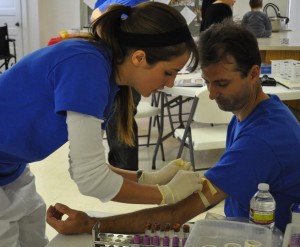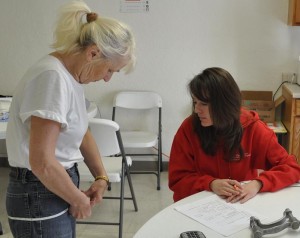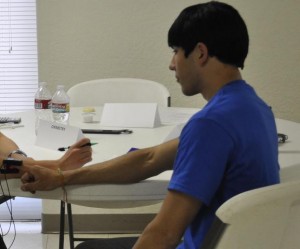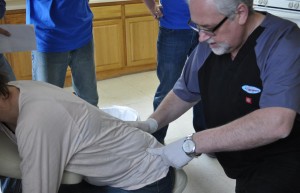Wellness Health Panel (Blood Draw) – Save $$$ Hundreds –
(Cost: $40.00)

Includes:
- Complete Blood Count (CBC)
- Lipid Panel
- Comprehensive Metabolic Panel (CMP)
- Uric Acid
- Thyroid Stimulating Hormone (TSH)
This screening provides baseline information on cholesterol, blood glucose, liver, kidneys, thyroid, and more. These screenings can help you and your doctor monitor your health and prevent health issues from becoming emergencies. In order to receive the most accurate results you should fast (DO NOT EAT ANYTHING OR DRINK LIQUIDS WITH SUGAR OR CREAM IN THEM) for 12 hours prior to attending a health fair. DRINK PLENTY OF WATER DURING YOUR 12-HOUR FAST and continue to take your regular medications. If you are diabetic, do not fast.
Prostate Specific Antigen (PSA) (Men Only Blood Draw) This screening is recommended for males 40 and older with a family history of prostate cancer, or all males 50 and older. PSA is a blood screening that measures a protein that is only produced by the male prostate gland.  Elevations of PSA may occur in men with non-cancerous prostate diseases or prostate cancer. A normal PSA level does not entirely exclude the possibility of prostate cancer. A digital rectal exam (DRE) is strongly encouraged in conjunction with PSA screening. All elevated values should be reported to your health care provider for further evaluation. (Cost: $25.00)
Elevations of PSA may occur in men with non-cancerous prostate diseases or prostate cancer. A normal PSA level does not entirely exclude the possibility of prostate cancer. A digital rectal exam (DRE) is strongly encouraged in conjunction with PSA screening. All elevated values should be reported to your health care provider for further evaluation. (Cost: $25.00)
Vitamin D Screening This screening is used to provide you with a baseline level of Vitamin D. Vitamin D deficiency is now recognized as a worldwide problem. Your body requires Vitamin D to absorb calcium and plays an important role in protecting your bone health. Many studies also suggest an association between low Vitamin D levels and an increased risk of certain types of cancers, nerve disease, immune disease and heart disease. Some Vitamin D is produced in your skin when unprotected skin is exposed to sunlight. Otherwise, you can obtain Vitamin D in foods or take Vitamin D in supplement form. Studies have found that many adults have low Vitamin D levels. This screening requires only one blood draw. Results will be included on the same report with your other blood draw results. If you already take Vitamin D you should have a blood level drawn to make sure you are taking enough Vitamin D. (Cost: $40.00)
Hemoglobin A1c (Blood Draw) A1C is a blood screening that measures your average blood sugar control for the past 2 to 3 months. The results give you a good idea of whether or not you are at risk for diabetes. For people with diabetes it indicates how well your diabetes treatment plan is working. (Cost: $25.00)
First Aid Available in case medical assistance is needed.
Blood Pressure Screening This screening gives you your blood pressure reading. Blood pressure is the force in the arteries when the heart beats (systolic pressure) and when the heart is at rest (diastolic pressure).  Blood pressure can fluctuate with exercise, injury, illness, and emotional reactions. Health care professionals check the participant’s blood pressure. If the participant’s blood pressure falls outside normal ranges, further evaluation by a healthcare provider is encouraged. Your blood pressure should notexceed 119/79. Pulse Screening is primarily measured on the participant’s wrist. The pulse corresponds to each beat of the heart. The normal number of pulse beats per minute in the average adult varies from 60 to 80, with fluctuations occurring with exercise, injury, illness and emotional reactions.
Blood pressure can fluctuate with exercise, injury, illness, and emotional reactions. Health care professionals check the participant’s blood pressure. If the participant’s blood pressure falls outside normal ranges, further evaluation by a healthcare provider is encouraged. Your blood pressure should notexceed 119/79. Pulse Screening is primarily measured on the participant’s wrist. The pulse corresponds to each beat of the heart. The normal number of pulse beats per minute in the average adult varies from 60 to 80, with fluctuations occurring with exercise, injury, illness and emotional reactions.
Vision Screening This screening checks how well you see at near and  far distances by reading letters on a basic eye chart. If you already wear glasses or contacts you should wear them during this screening. A prescription for eyeglasses and or contacts is not included.
far distances by reading letters on a basic eye chart. If you already wear glasses or contacts you should wear them during this screening. A prescription for eyeglasses and or contacts is not included.
Heart Health Corner In less than 3 minutes, the Cardiac Risk Assessment evaluates your current chance of having a heart attack in the next 10 years, and provides recommendations to improve your heart health. If educators are not available at the site, computers with internet access may be available for individual assessment.
Lung Function Screening This screening will determine if you have breathing issues such as asthma, Chronic Obstructive Pulmonary Disease (COPD) and pulmonary fibrosis. The goal of this screening is to measure the amount (volume) and/or speed (flow) of air that can be inhaled and exhaled.
Ask a Medical Question and Get a Referral This station provides you with the opportunity to speak one-on-one with a health professional and ask questions about any health issue concerning you or your family. During this session the health professional may review your overall health fair results, make recommendations for further evaluation, setting realistic goals with the individual, and provide referrals and resources for more information and/or education.
with the opportunity to speak one-on-one with a health professional and ask questions about any health issue concerning you or your family. During this session the health professional may review your overall health fair results, make recommendations for further evaluation, setting realistic goals with the individual, and provide referrals and resources for more information and/or education.
Height/Weight/Body Mass Index (BMI) Screening This screening provides you with your Body Mass Index (BMI), using your height, weight and waist measurement to identify your risk for heart disease, stroke and diabetes. BMI is considered reliable for assessing obesity. It does not take  into account a person’s fat-to-muscle ratio (muscle takes up space but weighs more than fat). Therefore, it is not a reliable measure for athletes or highly physically active participants.
into account a person’s fat-to-muscle ratio (muscle takes up space but weighs more than fat). Therefore, it is not a reliable measure for athletes or highly physically active participants.
Body Fat Skinfold Screening Find out your body fat levels with this screening by having your skin, muscle and fat thickness measured. Maintaining good body fat and muscle levels increases your overall strength and metabolism and reduces your risk of injury.
Body in Balance This screening checks your body position and posture, your flexibility, strength and balance to help you prevent injuries to your neck, back, knee, ankle foot and other areas.
Memory Screening The purpose of this screening is to test short-term memory related to Alzheimer’s disease using a memory impairment screening tool. Education about Alzheimer’s and other varieties of dementia will also be provided.
Nutrition Screening This screening provides an opportunity to speak with a dietitian and receive valuable information and resources on how to make healthy lifestyle changes. Poor nutrition or an unhealthy diet may lead to obesity, heart disease, diabetes or other nutrition-related diseases. Answer a short nutritional questionnaire to find out if your health may be at risk from an unhealthy diet.
healthy lifestyle changes. Poor nutrition or an unhealthy diet may lead to obesity, heart disease, diabetes or other nutrition-related diseases. Answer a short nutritional questionnaire to find out if your health may be at risk from an unhealthy diet.
Oral Health Screening This screening identifies tooth and gum disease and oral cancer by examining the inside of the mouth for sores and lesions. Education regarding the importance of periodic oral exams and risk factors for oral diseases is provided.
Pulse Oximetry This is a simple, non-invasive screening that measures the percent of oxygen in the blood. This number is obtained by placing an instrument on the finger which checks the percent of hemoglobin that is saturated with oxygen. This instrument can detect low blood oxygen before symptoms occur which can lead to lung and heart problems.
screening that measures the percent of oxygen in the blood. This number is obtained by placing an instrument on the finger which checks the percent of hemoglobin that is saturated with oxygen. This instrument can detect low blood oxygen before symptoms occur which can lead to lung and heart problems.
Skin Screening This screening provides a check for skin cancer and other skin problems. The screener may look at your scalp, face, neck, arms, hands, upper chest, back and legs.
Spinal Screening The purpose of this screening is to identify any problems with your spinal alignment and educate you about the importance of proper spinal alignment for a healthy body.
is to identify any problems with your spinal alignment and educate you about the importance of proper spinal alignment for a healthy body.
 Screening Information Booth If you are unsure what screenings are available or which screenings are right for you, a quick stop here will get you what you need.
Screening Information Booth If you are unsure what screenings are available or which screenings are right for you, a quick stop here will get you what you need.
Sleep Apnea Screening This screening consists of a series of questions that will help you determine if you need further evaluation for a very serious health issue. Sleep apnea affects one out of five people and is defined as a condition that causes an individual to experience pauses in breathing for 10 seconds or more while sleeping. Recent studies have identified sleep apnea as a risk factor for high blood pressure, irregular heartbeat, diabetes, heart attack or stroke.
























![Earthlings [Full Film]](http://wellnesshealthfair.com/data/thumbnails/22.png)
